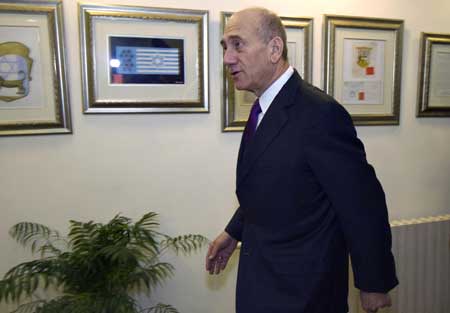 |
|
Israel's Prime Minister Ehud Olmert arrives for the weekly cabinet meeting in Jerusalem September 7, 2008. [Xinhua/Reuters Photo]
|
Israeli Prime Minister Ehud Olmert might reach the moment of his resignation as early as next week, yet so far there is no much sign indicating that he would relinquish his power that soon.
Meanwhile, his last-minute efforts both on the diplomatic and the domestic fronts have generated speculations that the embattled leader aims to leave his mark in the history during the overtime he is struggling to extend.
Since becoming prime minister in 2006, Olmert has been dogged by multiple police probes against him, and by constant criticism of his conduct during the 2006 war against the Lebanese Hezbollah movement.
Following the outbreaks of two latest scandals, a worn-looking Olmert announced in late July that he would not compete in his ruling Kadima party's primary elections and would step down upon the election of a new party chair. He has also said that he would resign if indicted.
Now on both tracks leading to the end of his premiership, the stranded leader has approached where he is expected to keep his words. The Kadima primary is to be held on September 17, and the police on Sunday advised Attorney-General Menachem Mazuz to indict him.
And apparently, Olmert is much closer to his resignation on the former track, as local media quoted prosecution sources as saying that it would take weeks and even months for Mazuz, who turned down police recommendations in the past to indict a sitting prime minister, to make a final decision.
By law, once resigning from his premiership after the primary, Olmert will become a caretaker prime minister, and his cabinet a caretaker cabinet, which will remain in power until the formation of a new government.
Desperate to make history despite being lame duck
Earlier this week, Mazuz said that the government should show restraint under the unusual and unique circumstances, in response to a petition from several lawmakers who demand the attorney general instruct Olmert to refrain from taking diplomatic or political moves that would bind future governments, according to local daily
Ha'aretz.
While stressing that the current government is not a transitional one, Mazuz was quoted as saying that Olmert's imminent resignation will soon make it such, and thus it should weigh the forcefulness with which it implements its policies.
However, Olmert the lame duck has shown no sign of restraint on both external and internal affairs.